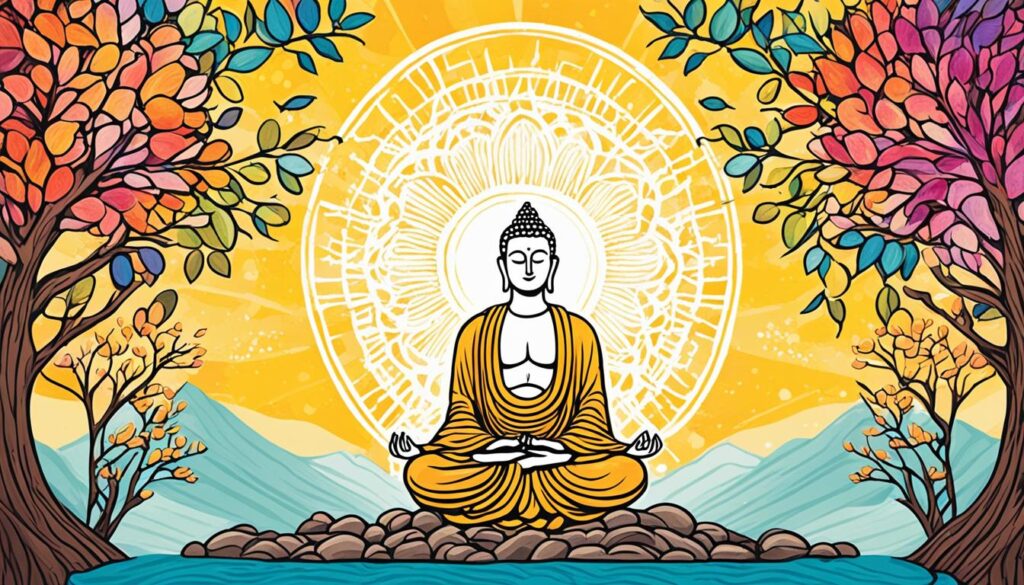“Let us rise up and be thankful, for if we didn’t learn a lot today, at least we learned a little, and if we didn’t learn a little, at least we didn’t get sick, and if we got sick, at least we didn’t die; so, let us be thankful.” – Buddha
Gratitude is a powerful force that can transform our lives. In a world filled with chaos and distractions, taking a moment to appreciate the blessings we have can bring immense joy and clarity. By embracing gratitude, we can unlock a pathway to greater mindfulness, positivity, and personal growth.
Each day, we have the opportunity to express our thankfulness through the #iamthankfulfor movement. By sharing our gratitude openly, we inspire others to cultivate their own daily gratitude practices, fostering a culture of appreciation and kindness.
Key Takeaways:
- Cultivating a daily gratitude practice can have a profound impact on our mindset and overall well-being
- Expressing gratitude shifts our focus from what is lacking to the abundance and blessings in our lives
- Gratitude strengthens social connections, promotes empathy, and contributes to societal harmony
- Buddhist teachings emphasize the importance of gratitude and mindfulness in fostering inner peace and compassion
- Incorporating gratitude into our lives helps us navigate modern challenges with resilience and perspective
The Impact of Gratitude on Personal Well-being
Gratitude is a powerful force that can have a profound impact on our personal well-being. When we embrace gratitude and practice thankfulness, we open our hearts to a multitude of benefits that can enhance our mental, emotional, and physical health. By shifting our focus from what is lacking in our lives to the abundance and blessings that surround us, we cultivate a positive and optimistic outlook on life.
Research has shown that gratitude has many positive effects on our well-being. Expressing gratitude can improve our mental health by reducing symptoms of depression and anxiety. It increases our happiness by promoting a sense of contentment and satisfaction with our lives. Gratitude can also reduce stress levels, leading to better overall health and a stronger immune system. Furthermore, practicing gratitude can enhance our self-esteem, as it helps us recognize our worth and value.
To fully experience the impact of gratitude on our personal well-being, incorporating positive affirmations and mindfulness techniques is key. Positive affirmations are powerful statements that reinforce positive beliefs and attitudes. By affirming our gratitude daily through statements like “I am grateful for the abundance in my life” or “I appreciate the small moments of joy,” we reinforce a mindset of thankfulness and attract more positive experiences.
Mindfulness is another crucial component of cultivating gratitude. Being mindful means being fully present in the moment and having an awareness of the beauty and blessings that surround us. By practicing mindfulness, we can appreciate the simple pleasures of life, such as a warm cup of tea or a beautiful sunset. Mindfulness helps us cultivate a deeper sense of gratitude by allowing us to recognize and savor the small moments of joy and beauty that often go unnoticed.
Embracing gratitude and incorporating positive affirmations and mindfulness techniques into our daily lives can have a transformative effect on our personal well-being. It enables us to shift our perspective, focus on the positive aspects of our lives, and cultivate a greater sense of appreciation and thankfulness. By practicing gratitude, we invite more positivity and joy into our lives, fostering a state of mind that promotes personal growth, resilience, and overall well-being.

The Role of Gratitude in Societal Harmony
Gratitude is a powerful force that goes beyond individual well-being and has the potential to foster harmony within society. When we express gratitude towards others, it creates a ripple effect, strengthening social connections and promoting empathy and compassion.
Grateful individuals are more inclined to engage in acts of kindness and contribute to the overall well-being of their communities. By practicing daily gratitude and appreciating the blessings in our lives, we can create a culture of appreciation and unity.
Imagine a society where gratitude becomes a daily practice for everyone. People would value and acknowledge one another, spreading positivity and gratitude in their interactions. This would not only enhance personal relationships but also create a more harmonious and supportive environment for all.
In a world where division and discord often prevail, embracing gratitude can be a catalyst for change. It helps us shift our focus from what we lack to what we have, fostering a sense of abundance and contentment. The more gratitude we cultivate, the more we realize the interconnectedness of our lives and the importance of supporting one another.
Practicing gratitude doesn’t have to be a solitary pursuit. We can encourage and inspire those around us to join in, creating a collective movement towards a more grateful society. By extending our appreciation and acknowledgment to others, we strengthen the social fabric that binds us together.
So, let us embrace gratitude as a daily practice, acknowledging the blessings and expressing appreciation for the people, experiences, and opportunities that enrich our lives. Together, we can build a society rooted in gratitude, compassion, and harmony.
Buddhism’s Teachings on Gratitude and Mindfulness
Buddhism has long recognized the importance of gratitude and mindfulness in promoting inner peace and harmony. The teachings of Buddhism offer valuable insights into the cultivation of gratitude as a means to develop a compassionate and interconnected mindset.
One of the core beliefs in Buddhism is the appreciation of the present moment and the beauty and abundance that surrounds us. By practicing mindfulness, we can bring our attention to the here and now, and truly appreciate the wonders of life.
Mindfulness practices, such as meditation, play a significant role in cultivating gratitude. Through meditation, we learn to quiet the mind and focus on the present moment. This allows us to observe our thoughts and feelings without judgment, and to develop a sense of gratitude for the simple joys and blessings that we often overlook.

By embracing gratitude and mindfulness in our daily lives, we can transform our perspective and become more appreciative of the interconnectedness between ourselves, others, and the world around us. This deep sense of gratitude can bring about a profound sense of peace, contentment, and joy.
The Benefits of Gratitude in Buddhism
Gratitude plays a vital role in the Buddhist philosophy for several reasons:
- Gratitude fosters humility and a sense of interconnectedness, recognizing the interdependence of all beings.
- Gratitude cultivates a positive mindset, allowing us to focus on the present moment and appreciate the abundance in our lives.
- Gratitude helps counteract feelings of greed and attachment by shifting our focus from what we don’t have to what we do have.
- Gratitude strengthens our relationships and sense of community, promoting compassion and empathy towards others.
Integrating Gratitude and Mindfulness into Daily Life
To integrate gratitude and mindfulness into your daily life, consider the following practices:
- Start each day with a gratitude affirmation or prayer, expressing thanks for the blessings in your life.
- Practice mindfulness meditation, focusing on your breath and observing your thoughts without judgment.
- Keep a gratitude journal, writing down three things you’re grateful for each day.
- Express gratitude towards others through acts of kindness and appreciation.
- Take time to pause and appreciate the beauty of nature and the small moments of joy in your day.
By incorporating these practices into your life, you can experience the transformative power of gratitude and mindfulness in aligning your mindset and fostering inner peace.
| Benefits of Gratitude in Buddhism | Integrating Gratitude and Mindfulness |
|---|---|
| 1. Fosters humility and interconnectedness | 1. Start each day with a gratitude affirmation |
| 2. Cultivates a positive mindset | 2. Practice mindfulness meditation |
| 3. Counters greed and attachment | 3. Keep a gratitude journal |
| 4. Strengthens relationships and community | 4. Express gratitude towards others |
| 5. Appreciate the beauty of nature |
Addressing Modern Challenges through Gratitude
In our fast-paced and often stressful modern world, incorporating gratitude into our lives can help us navigate challenges with greater resilience and perspective. The practice of gratitude can shift our focus from negativity and complaints to a mindset of abundance and growth. By acknowledging and appreciating the small joys and blessings in our lives, we can find moments of peace and contentment amidst the chaos. Gratitude gives us the strength to face adversity with grace and resilience.
The Power of Gratitude in Overcoming Stress
Stress has become a prevalent issue in our lives, affecting our mental and physical well-being. By incorporating gratitude into our daily routine, we can counteract the effects of stress and build emotional resilience. When we focus on the things we are grateful for, it helps us break free from the cycle of negativity and worry. Gratitude shifts our perspective and allows us to see the silver linings even in difficult situations. It reminds us that we have the power to choose how we respond to challenges and encourages a positive mindset.
Fostering a Growth Mindset through Gratitude
Gratitude helps us cultivate a growth mindset, which is essential for overcoming obstacles and achieving personal growth. When we express gratitude for our accomplishments and the lessons we learn from failures, it encourages us to persevere and continue striving for success. By shifting our focus from what we lack to what we already have, gratitude fosters a sense of abundance and empowers us to believe in our abilities. It fuels our motivation, inspires us to embrace challenges, and enables us to unlock our full potential.
The Role of Mindfulness in Gratitude
Practicing mindfulness alongside gratitude can deepen our appreciation for the present moment and enhance our overall well-being. Mindfulness involves being fully present and aware of our thoughts, emotions, and surroundings. When we practice gratitude mindfully, we engage our senses, savoring the small pleasures and experiences that often go unnoticed. Mindful gratitude promotes a sense of connection to ourselves, others, and the world around us. It helps us cultivate a sense of wonder and awe for the beauty and goodness that exists in our daily lives.
| Benefits of Gratitude in Addressing Modern Challenges | |
|---|---|
| Reduces stress and improves resilience | + |
| Fosters a growth mindset for personal growth | + |
| Enhances mindfulness and appreciation for the present | + |

By cultivating gratitude and incorporating it into our lives, we can overcome modern challenges with a renewed sense of positivity and resilience. The power of gratitude lies in its ability to shift our perspective, cultivate appreciation, and empower us to navigate life’s ups and downs with grace. By practicing thankfulness and mindfulness, we can find peace and contentment amidst the chaos, and embrace each day with a grateful heart.
The #iamthankfulfor Movement
The #iamthankfulfor movement is a social media initiative that encourages individuals to express gratitude and appreciation publicly. By sharing what you are thankful for, you inspire others to cultivate their own gratitude practices. The power of gratitude lies in its ability to shift your mindset and bring positivity into your life.
When you participate in the #iamthankfulfor movement, you not only acknowledge the blessings in your own life but also contribute to a culture of appreciation. By sharing your gratitude publicly, you create a ripple effect of positivity and mindfulness. It’s a simple yet powerful way to make a difference in the lives of others.
To join the movement, simply post on social media using the hashtag #iamthankfulfor. Share what you are grateful for, whether it’s the love and support of your friends and family, the beauty of nature, or the small moments of joy in your everyday life. Your words have the power to inspire others and cultivate a spirit of gratitude in the world.
Take a moment to reflect on all the reasons you have to be thankful. Through the #iamthankfulfor movement, let’s create a community united by gratitude, appreciation, and mindfulness.
Join the #iamthankfulfor movement today and spread the power of gratitude!

Conclusion
Embracing gratitude through daily practice and mindfulness can truly transform our lives. When we cultivate a mindset of appreciation and express thankfulness for the blessings we have, we open ourselves up to experiencing greater joy, contentment, and connection on a daily basis. Making #iamthankfulfor a part of our everyday routine allows us to tap into the power of gratitude and unlock its tremendous benefits.
Gratitude is not just a fleeting feeling; it is a way of life. By incorporating positive affirmations and mindfulness techniques into our gratitude practice, we deepen our sense of appreciation and amplify its effects. Through daily gratitude practice, we shift our focus from what is lacking to the abundance that surrounds us, enhancing our well-being and overall outlook on life.
As we express gratitude and appreciation for the big and small blessings in our lives, we create a ripple effect of positivity and kindness. Our practice of gratitude extends beyond ourselves, fostering social connection, empathy, and compassion. By embracing gratitude, we contribute to the creation of a harmonious and caring society.
So, let us remember the power of gratitude and make it a conscious part of our everyday lives. Take a moment each day to reflect on the things you are grateful for, big and small. Practice mindfulness and positive affirmations to deepen your sense of appreciation. By doing so, you will discover the profound and lasting impact that gratitude can have on your well-being and the world around you.

